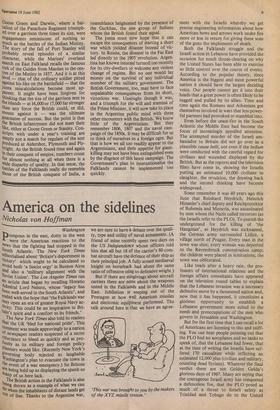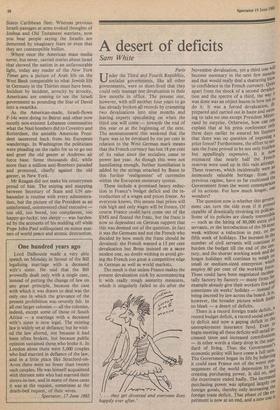America on the sidelines
Nicholas von Hoffman
pompous in the east, dotty in the west were the American reactions to the news that the fighting had stopped in the n 'citith Atlantic. The New York Times editorialised about 'Britain's deportment in victory' which ought to be calculated to avoid both 'a fascist orgy' in Buenos Aires and also a 'military alignment with the Soviet Union'. The Los Angeles Times ran an article that began by recalling Horatio Admiral Lord Nelson, whose 'legacy has been well-served in the South Atlantic', and ended with the hope that 'the Falklands war may open an era of greater Royal Navy ac-
This could be an inspiration to Bri- tain's spirit and a comfort to its friends.'
The New York Times also told its readers that the UK 'bled for national pride'. This c°rnment was made approvingly to a nation cq newspaper readers suspected of a secret reluctance to bleed as quickly and as pro- fusely as its military and foreign policy Planners would like. (Recently New York's governing body rejected as laughable ashington's plan to evacuate the town in the event of a war emergency.) So Britons are being held up as displaying the spunk so many of us here lack.
b The British action in the Falklands is also r,eMg shown as a example of what we can "Izi when the inhabitants of distant lands get °tit of line. Thanks to the Argentine war, we are sure to have a debate over the quali- ty, type and utility of naval armaments. (A friend of mine recently spent two days on the US Independence whose officers told him that all but 18 of the carrier's 80 com- bat aircraft have the defence of their ship as their principal job. A fully armed mediaeval knight on horseback had about the same ratio of offensive sting to defensive weight.)
But if there are misgivings about aircraft carriers there are none about the weapons tested in the Falklands and in the Middle East. Jubilation is seeping out of the Pentagon at how well American missiles and electronic equipment performed. The talk around here is that we have an agree- 'This war was brought to you by the makers of the X YZ missile system.' ment with the Israelis whereby we get precise engineering information about how American bows and arrows work under fire more or less in return for giving these sons of the guns the implements of death.
Both the Falklands struggle and the Israeli action in Lebanon have provided the occasion for much throat-clearing on why the United States has been able to exercise so little control over the course of events. According to the popular theory, since America is the biggest and most powerful nation it should have the largest deciding voice. Our people cannot get it into their heads that a great power is often likely to be tugged and pulled by its allies. Time and time again the Romans and Athenians got themselves involved in wars that less power- ful partners had provoked or stumbled into.
Even before the cease-fire in the South Atlantic the Middle East had become the focus of increasingly appalled attention. The attempted murder of the Israeli am- bassador to Britain did not go over as a plausible causa belli, not even if the bellum were conducted with the careful regard for civilians and wounded displayed by the British. But as the reports and the television films have come in, showing the Israelis putting an estimated 10,000 civilians to slaughter, the revulsion, the drawing back and the second thinking have become widespread.
Some remember it was 40 years ago this June that Reinhard Heydrich, Heinrich Himmler's chief deputy and Reichprotektor of Bohemia and Moravia, was assassinated by men whom the Nazis called terrorists (as the Israelis refer to the PLO). To punish the underground for the killing of 'the Hangman', as Heydrich was nicknamed, the German army surrounded Lidice, a village north of Prague. Every man in the town was shot; every woman was deported to the Ravensbruck concentration camp; the children were placed in institutions; the town was obliterated.
Like toads after a heavy rain, the pro- fessors of international relations and the foreign affairs consultants have appeared on the television round tables to explain that the Lebanese invasion was a necessary defensive move by a threatened nation and, now that it has happened, it constitutes a glorious opportunity to establish a Lebanese government more suited to the needs and preoccupations of the men who govern in Jerusalem and Washington.
But for the first time that I can recall a lot of Americans are listening to this and sniff- ing. You can hear people pointing out that the PLO had no aeroplanes and no tanks to speak of, that the Lebanese had fewer, that at the time of writing the Israelis have suf- fered 170 casualities while inflicting an estimated 12,000 plus (civilian and military, counting dead Syrians). Whatever the final verdict these are not Golden Golda's glorious days of 1967. Many are saying that the courageous Israeli army has conquered a defenceless foe, that the PLO posed as much of a threat to Israeli safety as Trinidad and Tobago do to the United States Caribbean fleet. Whereas previous Israeli passages at arms evoked thoughts of Joshua and Old Testament warriors, now you hear people saying the Israelis are demented by imaginary fears or even that they are contemptible bullies.
Where once the American mass media never, but never, carried stories about Israel that showed the nation in an unfavourable light, today any reader of the New York Times gets a picture of Arab life on the West Bank comparable to what Jewish life in Germany in the Thirties must have been. Incident by incident, atrocity by atrocity, Americans are coming to see the Israeli government as pounding the Star of David into a swastika.
As the American-made, Israeli-flown F-14s were doing to Beirut and other now mostly non-existent Lebanese communities what the Nazi bombers did to Coventry and Rotterdam, the amiable American Presi- dent sauntered back from his European wanderings. In Washington the politicians were pleading on the radio for us to go out and greet the old geezer at Andrews air force base. Some thousands did, while more than a million anti-Bombers paraded and protested, chiefly against the old geezer, in New York.
Mr Reagan did not make his countrymen proud of him. The sniping and snapping between Secretary of State and UN am- bassador is routine with every administra- tion, but the picture of the President as an uninformed, uninterested chief executive too old, too bored, too complacent, too happy-go-lucky, too sleepy — was harden- ed by the accounts of his nodding off while Pope John Paul soliloquised on minor mat- ters of world peace and atomic destruction.





































 Previous page
Previous page